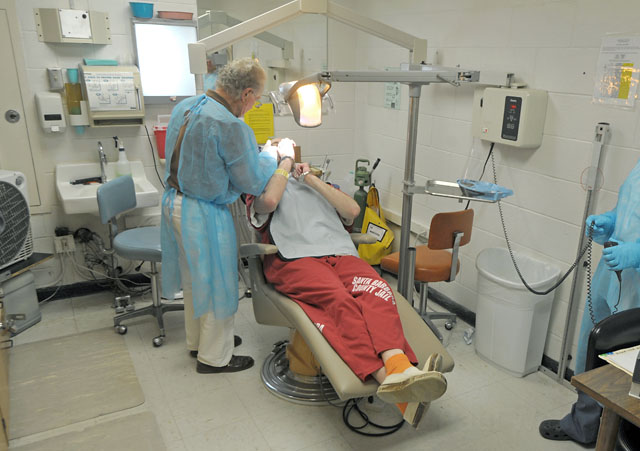Jail Care on Life Support?
ealth Provider Faces County Criticism

The difficult issue of medical services in County Jail moved forward Tuesday when the Santa Barbara supervisors decided to extend the Sheriff’s Office contract with Corizon Health, Inc. for a year and a half — but not before spanking Sheriff and Corizon representatives alike for about three hours.
Amid contention near and far about health care in county jails and pushed by activists fighting to keep the mentally ill out of custody, the supervisors decided in June to think twice about renewing a two-year, $10 million contract with Corizon, one of the country’s biggest correctional health-care providers that has contracted with Santa Barbara County for 20 years.
In June, the supes deemed the one-page agreement summary given to them inadequate, and they gave Sheriff’s personnel two months to provide evidence of Corizon’s performance; they asked for metrics about the screening process, the time it takes for inmates to receive psychiatric drugs, and details on complaint procedures, among other statistics. That frustration swelled two weeks ago when a bureaucratic mishap caused hundreds of pages of information — filling three fat binders — to go directly to the supervisors rather than to the Clerk-Recorder’s Office, where it would have been entered into the public record, and stalled the matter until Tuesday.
In his presentation, Undersheriff Barney Melekian, standing in for Sheriff Bill Brown, urged the supervisors to renew the contract for two years — rather than one — so the department could identify and establish benchmarks for best practices during the first year. In preparing for Tuesday’s hearing, Melekian said, he found no clear standards exist nationally. After a study, Melekian went on, the department could go out to bid in 2017 and use the study as the foundation for the competing bids.
But most of the supervisors flatly rejected that logic and decided to take a middle-of-the-road approach, extending the contract for 18 months, setting up a grievance coordinator to report regularly to the board and looking at other providers. The County Jail has seen its inmate population creep up — it was at 964 inmates on Tuesday — to levels that existed before the passage last year of Proposition 47, which reduced some theft and drug offenses from felonies to misdemeanors. In the past, it has risen to more than 1,110 people.
The undercurrent of the bitterness between the supervisors and the Sheriff’s Office has been serious confusion about the new North County Jail slated to open in 2018. In recent months, all five supervisors threw sticks at Sheriff Bill Brown for being elusive about the operating cost required for the $120 million project, which will hold 376 beds as well as a 228-bed STAR (Sheriff’s Transition and Reentry) complex.
On Tuesday, Melekian — who has impressed friends and foes of the Sheriff’s Office since he came on as Brown’s number two in January — made a brief reference to the North County Jail when he described challenges the department faces in the current jail, which was built in 1971, added onto in 1987, and holds wings that look as if they could exist on Alcatraz Island. “I was trying to stay away from that,” he said, “but we do need a new jail.”
At a tour of the jail last week, Commander James Meter, who has worked in the jail for 25 years, told me he refers to the facility as the Winchester Mystery House, an architecturally haphazard mansion in Northern California. Custody staff are now in the process of creating a new exam room out of what is currently a broom closet.
Separate from the strains between supervisors and sheriff, a number of long-term mental-health advocates — with Families ACT! and CLUE (Clergy and Laity United for Economic Justice) — have flooded the board with horror stories about friends and family who they claim suffered in jail.
Melekian acknowledged criticisms surrounding treatment of inmates, adding perception always trumps data. “I could stand up here and show numbers and charts and all of those things, and at the end of the day if someone’s loved one is in custody and there is a perception they are not receiving the health care to which they are entitled,” he said, “that is a problem.”
Melekian said there were 555 medical grievances from 2013-2015. Of those, he said, 58 percent of services were actually already in place but for some reason had not connected with the inmate. And for a quarter of the grievances, Melekian went on, steps were taken immediately to resolve the problem. A grievance is a formal process, whereas a “kite” is an informal request. Melekian did not know the number of kites that turned into grievances, but he said staff acts on all of them. “They do not vanish into the ether,” he said.
In initial deliberations, Supervisor Salud Carbajal said he found it “a little bewildering” the Sheriff’s Office did not know how Corizon’s services stacked up against other counties in California. What’s more, Carbajal went on, Corizon executives at the hearing could not say what percentage of county jails in the state had been accredited by either the National Commission on Correctional Health Care (NCCHC) or the state’s IMQ (Institute for Medical Quality).

In fact, the County Jail was IMQ certified until 2007, though no one from the department could answer why the decision was made not to continue that accreditation process. In 2014, the department started discussions about the NCCHC accreditation — said to be a more stringent process in some aspects than IMQ — but the application was never completed. “We’re just not there,” Melekian said, noting many facilities are not accredited, because it is a significant and costly staff undertaking. “It’s not a failure that we don’t have it. It is a worthwhile goal to get to.”
Currently, custody officials and Corizon staff meet to discuss shortcomings. For instance, so far this year, 90 percent of all inmates were fully evaluated (beyond an initial screening) within 14 days, which is considered the industry standard. Ninety-five percent is the goal. Last year, 88 percent were seen in two weeks, and in 2013, 93 percent were.
About a dozen commenters, most with Families ACT! or CLUE, were not satisfied with the presentation that eventually included a number of Sheriff’s personnel and Corizon execs. They urged the board to extend the contract one year, calling it the better of two evils. One public commenter, who said she had only been arrested for drinking in public, said she was left in a small compartment soiled with feces and blood for 24 hours after being tackled by two female cops. “When I am not on meds, I feel like I am being tortured,” she said. The jail has four safety cells, commonly called “rubber rooms,” for inmates who are believed to be suicidal.
James Robertson, who volunteers in the jail, said he had the utmost respect for the employees working in the jail, but he did not believe inmates were receiving adequate health care. One issue, he said, is people are not receiving their meds.
When inmates who are on medication are booked in jail, according to Corizon exec Harold Orr, their doctor is contacted. Orr said an on-call psychiatrist is also available, and PharmaCorr — the pharmacy owned by Corizon that took over distributing prescriptions last year — can provide the meds as soon as the next business day. ADMHS (Alcohol, Drug and Mental Health Services) director Alice Gleghorn, who was called to the podium to weigh in, said the discontinuation of particular medications is a concern to her, and she is working with the Sheriff’s Office to ensure there is no disruption of service. “Some meds are not covered under the jail formulary,” she said, adding there are reasons based on the incarceration setting.
Supervisor Peter Adam, who hammered the speakers about the accreditation issue, said he did not have the psychiatric expertise to second-guess Corizon staff. But Supervisor Janet Wolf, who voted against the Corizon contract in 2006 and submitted several detailed questions to the Sheriff’s Office, said she heard from ill inmates who have not received their psychiatric meds for the last two weeks. “Somewhere it just feels like the ball is being dropped,” she said.
Currently, there are ombudsmen working sporadically in the jail to handle complaints, but Melekian said custody officials were not receiving any information from them. “We are hearing [from them],” Carbajal said. “Maybe you are not.”
The supervisors will discuss the cost of the grievance coordinator at a future date; Corizon and the Sheriff’s department agreed to split the bill.



